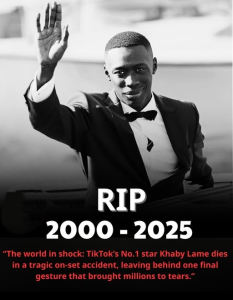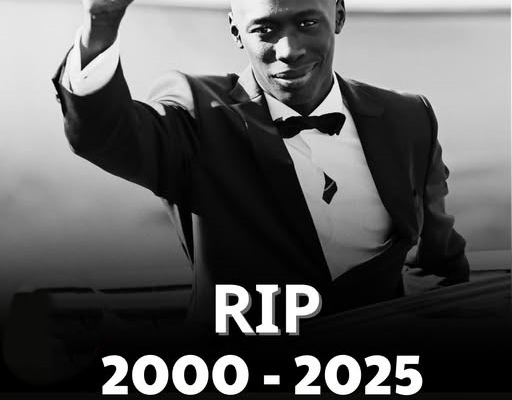
How Fake Celebrity Death Rumors Spread — and Why They’re So Harmful
In an era where news spreads at the speed of a click, a single tweet or viral post can set off a global wave of panic. Over the past few years, countless celebrities, influencers, and public figures — including Khaby Lame — have become the subject of sudden, false “death” rumors. These stories appear out of nowhere, spread like wildfire, and often leave millions confused, alarmed, or grieving something that never happened.
The Sudden “Breaking News” That Isn’t
It often begins with a dramatic headline: “BREAKING NEWS: [Celebrity Name] confirmed dead in tragic accident.” Sometimes the claim is accompanied by a fake photo, a video edited to look like a news broadcast, or an alleged “official statement” that was never made.
Within minutes, fans start sharing the post, adding comments like “This can’t be true” or “Rest in peace.” The emotional reaction — shock, grief, disbelief — fuels the speed of the rumor’s spread. Before long, the false story trends on multiple platforms, and people who never saw the original source begin to assume it must be real.
Why Celebrities Are Common Targets
Celebrities like Khaby Lame, who have massive global followings, are frequent targets of such hoaxes. The bigger the fan base, the faster the rumor travels. Their names are familiar, their faces are everywhere, and millions of people care deeply about their lives — making them ideal subjects for misinformation campaigns.
Some hoaxes are started as pranks. Others are driven by malicious actors hoping to gain clicks, followers, or advertising revenue. In some cases, bots amplify the posts automatically, increasing their reach.
The Role of Social Media Algorithms
Social media platforms are designed to reward engagement. The more people like, share, or comment on a post, the more visible it becomes. Unfortunately, false and emotional stories often spread faster than factual, verified news.
Algorithms don’t know the difference between truth and lies — they only know which content is “popular.” This means that a fake death announcement can climb to the top of people’s feeds in record time, even before any real journalist can fact-check it.
The Real-World Consequences
For fans, seeing a headline about a beloved figure’s death can feel devastating. Many people have grown up watching Khaby Lame’s silent, witty videos — his humor and charm made him one of the most recognizable online creators in the world. Hearing that someone like him has “died” can trigger intense grief, even among those who have never met him.
For the celebrity and their family, however, the impact can be even more serious. Imagine waking up to thousands of messages mourning your death. Family members and friends might receive calls in the middle of the night. Panic spreads offline, too — not just online.
In some documented cases, celebrities have had to hold press conferences or make emergency social media posts to prove they’re alive. This can be emotionally draining and disrupt their personal lives and careers.
How Journalists and Fact-Checkers Respond
When false death rumors emerge, legitimate newsrooms and fact-checkers act quickly to verify or debunk the claims. They look for:
-
Official statements from family or management.
-
Confirmation from credible authorities.
-
Evidence from reputable sources.
If none of these exist — and often they don’t — the story is identified as a hoax. Reputable outlets then publish corrections, but by that point, the rumor may already have reached millions.
Why Some People Believe Hoaxes So Quickly
Psychologists have found that humans are wired to respond to emotional information. Sad, shocking, or sensational stories grab attention more powerfully than ordinary ones. When someone sees “Khaby Lame dead after catastrophic accident,” their emotional reaction comes before their logical reasoning.
They may not pause to check whether the story is from a legitimate source. This is why misinformation can spread faster than the truth: emotion travels more quickly than evidence.
How to Tell If a Story Is Fake
Before sharing or reacting to a celebrity death rumor, here are some steps anyone can take:
-
Check the source. Is it a verified news outlet or an unknown page?
-
Look for official statements. Real deaths are confirmed by family, management, or credible media.
-
Cross-check. If only one random page is reporting it, that’s a red flag.
-
Watch for vague language. Fake stories often say “reportedly” or “sources say” without naming sources.
-
Be skeptical of emotional bait. Overly dramatic language is a warning sign.
Why People Start These Hoaxes
Some hoaxes are created for attention. Others may aim to direct traffic to scam websites or phishing pages disguised as “memorial sites.” In more malicious cases, rumors are started to damage reputations or manipulate public opinion.
Because these hoaxes often generate millions of clicks, there’s a clear incentive for bad actors to keep creating them — unless audiences learn to stop amplifying them.
What Happens When Celebrities Respond
When celebrities debunk their own death rumors, it can be a surreal moment. They may post a selfie with the caption, “I’m alive,” or release a short statement thanking fans for their concern. Khaby Lame himself has previously used humor to respond to internet trends, though in cases like death hoaxes, even humor can’t fully erase the damage.
Debunking a hoax may stop the rumor, but it can’t undo the emotional shock felt by millions of fans. In some cases, these false reports linger for years, resurfacing every few months.
The Legal and Ethical Angle
Spreading false death rumors about real people can have legal consequences. In some countries, such actions can lead to defamation lawsuits, especially if the hoax harms a person’s reputation or causes financial damage. Platforms have started to take stronger measures to limit the spread of false news, but enforcement remains inconsistent.
Ethically, it’s a matter of responsibility. Words have power — and sharing unverified claims can hurt real people.
Building a More Responsible Online Culture
Stopping the spread of false rumors requires a collective effort. Journalists, platforms, and everyday social media users all play a role. By verifying information, refusing to share unconfirmed claims, and calling out hoaxes when they appear, users can help slow down misinformation.
When people understand how these hoaxes work, they’re less likely to fall for them — and less likely to pass them on.
✅ Bottom line: There is no verified news that Khaby Lame has died. This claim is a false and harmful rumor that reflects a broader problem: how misinformation can spread rapidly online.

